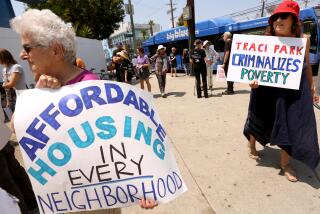U.N. Decries Zimbabwe’s Effort to Raze Homes, Shops of Its Poor
- Share via
JOHANNESBURG, South Africa — U.N. Secretary-General Kofi Annan called on Zimbabwe on Friday to halt the “catastrophic injustice” of a government campaign to demolish slum housing and street stalls, after a U.N. report found that 700,000 people had been left homeless or jobless and that an additional 2.4 million had been affected since the program began in May.
The report says the evictions and demolitions violate international law and were undertaken in an indiscriminate and unjustified manner, and that it will take several years for Zimbabwe to recover from the policy, which government officials say is designed to eliminate chaotic and illegal housing and trade.
In May, after elections won by the ruling ZANU-PF party but which European nations and the United States criticized as fraudulent, Zimbabwean authorities launched a campaign to “clean up” urban areas by destroying street stalls, shacks and informal housing.
The opposition Movement for Democratic Change said the campaign by President Robert Mugabe’s regime was designed to punish the poor in urban areas, who had predominantly voted against Mugabe’s party.
Annan described the report’s findings as “profoundly distressing” and called for those behind the campaign to be held accountable. He pledged that the U.N. would mount a humanitarian effort for the victims.
The report, by Anna Tibaijuka, the U.N. special envoy on human settlement issues in Zimbabwe, describes the eviction policy as “a disastrous venture based on a set of colonial-era laws and policies that were a tool of segregation and social exclusion.”
The campaign has wrecked the informal economy and “precipitated a humanitarian crisis of immense proportions,” the report says.
It stops short of charging that Zimbabwean authorities have committed crimes against humanity.
“The international community should encourage the government to prosecute all those who orchestrated this catastrophe and those who may have caused criminal negligence leading to alleged deaths,” it says, and calls for an independent investigation of deaths.
Criticism of the campaign, which the government named Operation Murambatsvina (Clean Out the Filth), has been sharp in the West but muted in Africa, particularly in the neighboring country of South Africa.
The evictions have come at a time of economic crisis marked by food shortages, a lack of hard currency, budget deficits and triple-digit inflation. With fuel in extremely short supply, Zimbabwe’s airline has canceled domestic and international flights in recent days.
The country could face expulsion from the International Monetary Fund for failing to service its debt, and it reportedly has appealed to South Africa for a loan.
Although Zimbabwean Foreign Minister Simbarashe Mumbengegwi promised a massive housing construction program as a result of the campaign, the U.N. report questions how the nation could afford that, saying the government could not address the needs of the displaced without international help.
Mumbengegwi said in a statement Friday that the campaign, which he said was over, had been designed to stem crime and chaotic urbanization and to halt prostitution, which helped spread HIV/AIDS and other social ills.
He said the language of the report was “value-laden and judgmental” and showed bias against the government.
He disputed that the demolitions violated international law and said the report grossly exaggerates the number of people affected. The report is clearly hostile to the operation and fails to portray massive construction going on nationally and the “consequent sanity which now prevails countrywide,” he said.
Opposition critics and human rights advocates in Zimbabwe said the report indicates the need for the U.N. Security Council to intervene to stop abuses by Zimbabwean authorities.
“This is not a one-off thing,” civil rights activist Tony Reeler said in a telephone interview. “In the previous five years, groups within Zimbabwe have made sustained and detailed allegations of gross human rights violations like extrajudicial killings and torture,” he said.
“When you look at Operation Murambatsvina, it’s not an aberration by the government but part of systematic abuses of the rights of Zimbabwean citizens,” he said.
“One would hope that the Security Council, looking at the report and the seriousness of the report, and looking at it in the context of sustained human rights violations that have taken place, would then be obliged to take action,” Reeler said.
MDC spokesman Tendai Biti said Zimbabwe was facing a massive humanitarian crisis because of the government and its failures.
“It’s high time the U.N. Security Council took some action against Zimbabwe,” he said. “I know there’s a great reluctance and a great indifference in the U.N. when it comes to Africa.”
Annan said the world body would urgently seek an agreement from Zimbabwe to mobilize humanitarian assistance.
“For its part, the government must recognize the virtual state of emergency that now exists, allow unhindered access for humanitarian operations and create conditions for sustainable relief and reconstruction,” he said.
More to Read
Sign up for Essential California
The most important California stories and recommendations in your inbox every morning.
You may occasionally receive promotional content from the Los Angeles Times.













